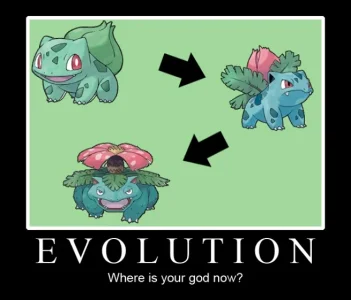In London (I think it was) there was a species of moth that was generally light in colour (although there were some variations in colour), this moth blended in well with the light coloured tree bark and manmade objects, this meant it could happily go about it's life having lots of light coloured babies. However when the industrial revolution occured soot and grim become common around the city, most surfaces became much darker than they were before. This exposed the light coloured moths as easy targets against the dark walls or trees, most were quickly eaten by birds and other insects but the ones that survived were the ones with darker variations of colour (they blended in with the environment so were able to survive long enough to have lots of babies). The most successful breeders were the darker moths, within a few generations (not long in human terms) the species had become almost entirely dark coloured. Now this all happened over a very short period of time but if you apply the same concept over very long periods of time then you will see similar refinements that increase chances of survival, the more time that passes the more complex the animal seems, it has been refined into a specialized niche. All it takes is variation in genes (what sex is for) and loooong periods of time.


